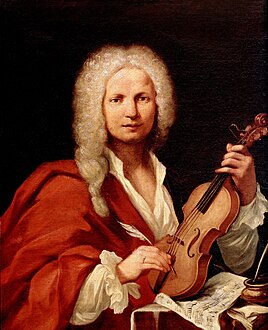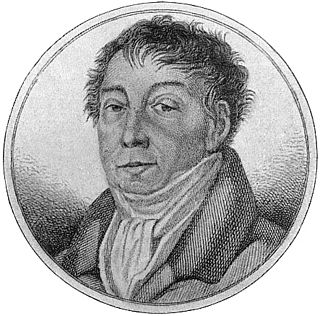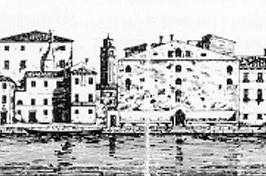
Antonio Lucio Vivaldi was an Italian Baroque composer, virtuoso violinist, teacher, impresario, and Roman Catholic priest. Born in Venice, the capital of the Venetian Republic, Vivaldi is regarded as one of the greatest Baroque composers, and his influence during his lifetime was widespread across Europe, being paramount in the development of Johann Sebastian Bach's instrumental music. He composed many instrumental concertos, for the violin and a variety of other musical instruments, as well as sacred choral works and more than fifty operas. His best-known work is a series of violin concertos known as the Four Seasons.

Pietro Antonio Domenico Trapassi, better known by his pseudonym of Pietro Metastasio, was an Italian poet and librettist, considered the most important writer of opera seria libretti.

Baldassare Galuppi was a Venetian composer, born on the island of Burano in the Venetian Republic. He belonged to a generation of composers, including Johann Adolph Hasse, Giovanni Battista Sammartini, and C. P. E. Bach, whose works are emblematic of the prevailing galant music that developed in Europe throughout the 18th century. He achieved international success, spending periods of his career in Vienna, London and Saint Petersburg, but his main base remained Venice, where he held a succession of leading appointments.

Opera seria is an Italian musical term which refers to the noble and "serious" style of Italian opera that predominated in Europe from the 1710s to about 1770. The term itself was rarely used at the time and only attained common usage once opera seria was becoming unfashionable and beginning to be viewed as something of a historical genre. The popular rival to opera seria was opera buffa, the 'comic' opera that took its cue from the improvisatory commedia dell'arte.

Luigi Marchesi was an Italian castrato singer, one of the most prominent and charismatic to appear in Europe during the second half of the eighteenth century.
This is a list of notable events in music that took place in the year 1735.

L'Olimpiade is an opera libretto in three acts by Metastasio originally written for an operatic setting by Antonio Caldara of 1733. Metastasio’s plot vaguely draws upon the narrative of "The Trial of the Suitors" provided from Book 6 of The Histories of Herodotus, which had previously been the base for Apostolo Zeno's libretto Gli inganni felici (1695). The story, set in Ancient Greece at the time of the Olympic Games, is about amorous rivalry and characters' taking places to gain the loved one. The story ends with the announcement of two marriages.

Farnace is an opera by Italian composer Antonio Vivaldi, set to a libretto by Antonio Maria Lucchini initially set by Leonardo Vinci during 1724. Vivaldi's setting received its first performance in 1727 at the Teatro Sant'Angelo in Venice. Popular at the time, and revived with great success at the Sporck theater in Prague in 1730, Vivaldi's Farnace slipped into oblivion until the last quarter of the 20th century when it emerged from obscurity.
Demofonte is an opera seria libretto by Metastasio. The libretto was first set by Antonio Caldara in 1733, but remained popular throughout the eighteenth century and was set over seventy times.

Giuseppe Aprile was an Italian castrato singer and music teacher. He was also known as 'Sciroletto' or 'Scirolino'.

Caterina Gabrielli, born Caterina Fatta, was an Italian coloratura singer. She was the most important soprano of her age. A woman of great personal charm and dynamism, Charles Burney referred to her as "the most intelligent and best-bred virtuosa" that he had ever encountered. The excellence of her vocal artistry is reflected in the fact that she was able to secure long-term engagements in three of the most prestigious operatic centers in her day outside of Italy.

L'Olimpiade is a dramma per musica in three acts that was composed by Antonio Vivaldi. The opera uses an Italian libretto by Pietro Metastasio that was originally written for Antonio Caldara's 1733 opera of the same name. Vivaldi's version premiered in Venice at the Teatro Sant'Angelo on 17 February 1734. The same libretto was to be later set to music by over 50 other composers, starting from Giovanni Battista Pergolesi in 1735.

Giuseppe Maria Orlandini was an Italian baroque composer particularly known for his more than 40 operas and intermezzos. Highly regarded by music historians of his day like Francesco Saverio Quadrio, Jean-Benjamin de La Borde and Charles Burney, Orlandini, along with Vivaldi, is considered one of the major creators of the new style of opera that dominated the second decade of the 18th century.

Antonio Salvi was an Italian physician, court poet and librettist, active mainly in Florence, Italy. He was in the service of the grand-ducal court of Tuscany and the favourite librettist of Prince Ferdinando de' Medici. Salvi was one of the developers of the opera seria.

The Teatro San Angelo or Teatro Sant' Angelo was once a theatre in Venice which ran from 1677 until 1803.
Romina Basso is an Italian mezzo-soprano with an extensive discography of baroque opera recordings. She is particularly noted for her performances of Vivaldi.

L'oracolo in Messenia is a 1738 opera by Antonio Vivaldi to a libretto by Apostolo Zeno. The opera was composed for the autumn Venetian carnival season of 1738 after Vivaldi took over the Teatro San Angelo from the impresario who had managed it the year before.
Collegium 1704 is a Czech early music orchestra and choir founded in 2005 by the Czech conductor, harpsichordist, and horn player Václav Luks. The Collegium Vocale 1704 is the affiliated vocal ensemble. Since 2007, the ensemble has been making regular guest appearances at festivals and concert halls all over Europe: the Salzburger Festspiele, the Berliner Philharmonie, London’s Wigmore Hall, Vienna’s Theater an der Wien and Konzerthaus, the Lucerne Festival, BOZAR in Brussels, the Chopin Festival in Warsaw, Wratislavia Cantans, and the Elbphilharmonie, and it is an ensemble-in-residence at the festival Oude Muziek in Utrecht and at the Leipzig Bachfest. In 2008, Music Bridge Prague — Dresden began, bringing together the two cities’ wealth of cultural traditions. In 2012 Collegium 1704 started a concert series at the Rudolfinum in Prague. Since autumn 2015, the two cycles have been merged into a single concert season that continues to take place in parallel in Prague and Dresden. In 2019 Collegium Vocale 1704 launched a series of chamber choir concerts in Prague.

L'Olimpiade is an opera in the form of a dramma per musica in three acts by the Italian composer Giovanni Battista Pergolesi. Pergolesi took the text, with a few modifications, from the libretto of the same name by Pietro Metastasio. The opera first appeared during the Carnival season of 1735 at the Teatro Tordinona in Rome and "came to be probably the most admired" of the more than 50 musical settings of Metastasio’s drama.













